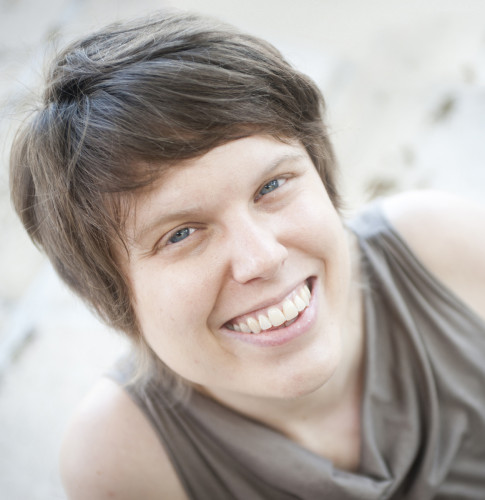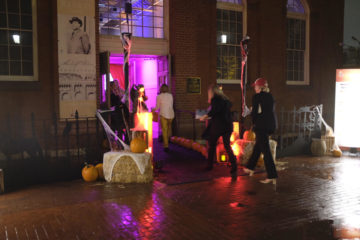Rebecca Parrish

Meet Rebecca Parrish. She is a director and cinematographer and has run her own Chicago-based film company, Interchange Productions since 2007. We came across her here in DC when her latest project, Radical Grace, had its premiere debut at the AFI Docs Fest in late June. The film tells the story of three Catholic nuns who take on great risk and responsibility as they challenge the conservative patriarchal beliefs of the Church in pursuit of a higher calling: social justice. Rebecca follows the nuns across the country, into congress members’ offices, and even to the Vatican as they bravely fight for what they believe to be the true values of Christianity. Interestingly, Rebecca is very open about the fact that she, herself is a “none” meaning a non affiliate with any particular religious practice. Moved by the story and intrigued by what inspired it, I was thrilled at the opportunity to speak with Rebecca further.
1. What was your original inspiration behind the film? Was the storyline something you had imagined ahead of time or something that evolved as you went along?
I’m one of the “nones,” part of a growing demographic of religiously unaffiliated millennials, so I could never have predicted that I’d be making a film about nuns! Back in 2011, I didn’t set out to make a film about religion. What became “Radical Grace” started out as a project documenting unique acts of social justice. That’s how I stumbled into the amazing life and work of Sister Jean Hughes, who was working with formerly incarcerated felons on the West Side of Chicago. Before that, my image of Catholic nuns was drawn entirely by Hollywood. I thought they all wore habits, lived a cloistered life of prayer and ritual and were very conservative. Sister Jean exploded my stereotypes. Her passion for justice, and deep, irreverent spirituality had me hooked.
I realized that the story of women like her, injecting their spirituality into their work for social change, was something I wanted to share with the world. I realized that even though I don’t consider myself a religious person, the most spiritual I have ever felt is when I’ve participated in social justice work.
The beauty of documentary is that in not knowing where your story will lead, you learn so much about yourself in the process. I would never have thought that issues grounded in a faith that’s not mine, and the stories of these women who lead such different lives than my own, would so intensely shape who I am and how I see the world today.
2. Catholicism and “radical” feminism aren’t typically thought of as going hand in hand; but in the film they create a complimentary marriage. Can you shed some light on how these two dynamic subjects came together in Radical Grace?
Gloria Steinem said “religion is often politics made sacred. If God is a man, then man is God. We need to return and go forward to the understanding that there is God in all living things, not more in men than women.” I think the next frontier of feminist organizing is happening within faith communities.
One of our subjects, Sister Chris, is an activist for women’s full equality in the Catholic Church. I was enthralled when I met Sister Chris because it had never even occurred to me that activists could work to reform a religious institution from within. It feels silly to say that now, but I’ve realized that I had been duped by conservative religious leaders who maintain power by perpetuating the myth that in order to be a person of faith, you must share their beliefs.
On one hand, the institutional Catholic church is the very definition of patriarchy. But I learned that the Catholic Church, or for that matter any faith tradition, is not defined exclusively by the institution or what it’s clerical leaders espouse. Rather, it’s the people who make up the church. And by calling on the feminist roots within the tradition (as one protest sign in the film reads, “Jesus was a ‘radical feminist”), the people can transform it.
Religious institutions have enormous reach into people’s’ lives. And the Catholic Church is one of the largest religious institutions in the world. The oppression of women in the Church isn’t only about what happens for people at Sunday Mass, it affects women’s lives a really deep way, from the power they have within their own homes to the public policy of their governments. The sisters have taught me that women’s equality in religious institutions is vital to ending the subjugation of women and girls around the world.
3. Have you encountered much resistance or opposition to the film or its message?
Overall, the response has been overwhelmingly positive and heartening, especially from Catholics, both women and men, who were motivated to help reshape the Catholic church towards equality, justice, and love, from the inside out. My favorite responses come from non-religious people, or from people who were raised Catholic but left the church due to disagreements with some its teachings, who loved the film, connected with it, and discovered a way of practicing spirituality that resonated with them, through the story of the three sisters.
When we put the first version of the trailer online about a year ago, there were a lot of negative comments about the sisters, most of them expressing the opinion that the nuns simply weren’t nuns, or Catholics, or even Christians – that they were heretics! Others reminded those naysayers that Jesus himself was a heretic in his time. Some people commented wondering why the nuns didn’t choose a different religion, or declare themselves atheists. But the sisters are deeply Catholic. Their Catholic faith is rooted in love and a progressive praxis called Catholic Social Teaching, which isn’t found in rigid dogmas, but in living love, bettering society, and helping those who need it most.
4. What was your greatest challenge in the making of the film?
One of our biggest challenges was finding our subjects. We conducted hundreds of research interviews, spending years searching for subjects who were willing to say in public what so many Sisters would only share in private. Thankfully, we found Sisters Simone, Chris and Jean, who were eager to speak truth to power.
Directing an indie documentary is all about persistence. Whether it’s securing buy-in from subjects or raising money, we may be told “no” more often than “yes.” In crafting the story, we go through a long phase where it doesn’t work [until] it does. So in every respect, it’s all about holding onto our vision. We have to keep working, keep asking and keep tweaking until that vision is realized. As women, we’re often socialized to be acquiescent. Personally, sometimes I feel like I’m being rude or annoying when I’m pushing to make something happen. And maybe some people will see it that way, but I work hard to resist that feeling and push forward with what I need to get done.
5. Whats next for Radical Grace? For you?
I’ve realized that regardless of whether you’re a Catholic, a Muslim, a Jew, or a “none,” the stories of Jean, Chris, and Simone show that you can approach service from a spiritual place in a way that is uniquely nourishing and sustaining. My hope is that audience members will leave the theater with a renewed sense of purpose and energy. I’ve learned so much from the Sisters, and now our goal is for “Radical Grace” to help pass their energy and their passion on to more activists, helping them find that feeling of communion in their own work.
Because we’ve been so inspired by the Sisters’ story, we are launching a social-impact campaign that will help reframe faith and morality as a force for the progressive movement. For too long, the dominant narrative has been that faith belongs to conservatives. In some ways, faith has been wielded as a weapon in political discourse — to separate people with different ideas and different needs. This film shows a different side of religion — one that is inclusive. Collaborating with secular and faith-based social justice organizations, we will leverage the film to support reform within religious institutions to end subjugation of women and girls in the U.S. and around the world and bridge divides to build a stronger progressive and feminist movement.








